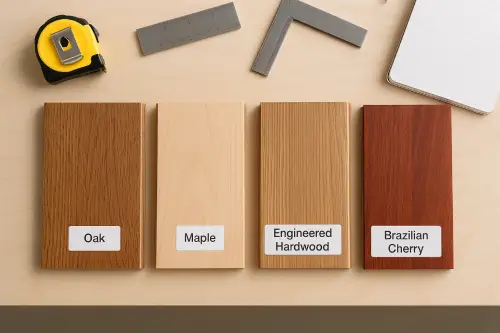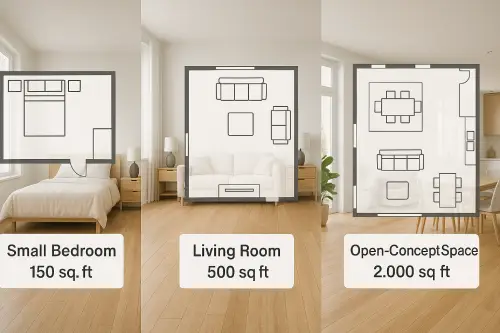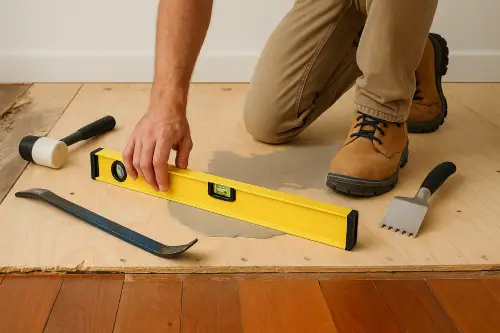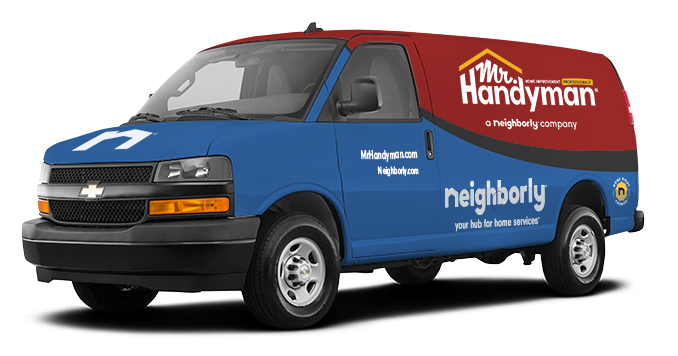Mr. Handyman explains hardwood flooring costs and installation steps.
|
Thinking about new floors? Hardwood is hard to beat — it’s strong, classic, and instantly elevates any space. It also happens to be one of the best long-term investments you can make in your home.
But how much does hardwood flooring really cost? The answer depends on a few key factors: the type of wood, the size of your space, labor, prep work — and yes, a few sneaky extras.
In this guide, we’ll walk you through what to expect, what to budget for, and how to get the most out of every plank.
Hardwood Flooring Costs by Type

Let’s start with what usually makes up the biggest chunk of your budget: the flooring itself. Hardwood flooring cost depends on the material you choose, and there’s a wide range. From classic oak to reclaimed barnwood, every type of hardwood brings its own style, benefits, and price point.
Here’s a quick breakdown of what the most popular hardwood floors typically cost per square foot (not including installation):
- Solid hardwood ($5–$10): Traditional and long-lasting. Can be refinished several times, which adds to the value, but also increases the price.
- Engineered hardwood ($3–$8): Looks just like solid wood but built with layers for added stability. A great pick if you want the look without the higher price tag.
- Exotic hardwoods ($8–$20+): Unique and eye-catching woods like Brazilian cherry or mahogany. Beautiful, but on the higher end of price per sq. ft.
- Reclaimed wood ($10–$20): Full of character and eco-friendly. Great if you love that weathered, lived-in look — just know it usually costs more to source and install.
- Bamboo ($3–$6): Technically a grass, but acts like hardwood. Affordable, fast-growing, and great for modern spaces.
- Cork ($5–$8): Soft, warm, and naturally quiet underfoot. Not as common, but a solid pick for low-traffic areas.
Tip from Mr. Handyman: These numbers are general ranges for materials only. We'll include labor, subfloor prep, and hidden costs next, which can add a few more dollars per square foot to your total cost.
Not sure if hardwood is right for your home? Compare your options with this quick guide on flooring type pros and cons.
What Affects Hardwood Flooring Installation Cost?
Once you’ve picked your flooring, the next big piece of the puzzle is installation — and this is where the numbers can shift. While the average hardwood flooring cost per square foot lands between $6 and $12 for materials, several behind-the-scenes factors can push that total up or down.
Let’s break down what really affects your bottom line:
Labor rates
Labor typically makes up a big chunk of your total cost. Installation cost varies depending on your location, the contractor’s level of experience, and job complexity. Homeowners in major metro areas often pay more than those in rural or suburban regions, so be sure to compare local quotes when budgeting.
Room size and layout
Larger rooms often require fewer cuts and transitions, meaning a lower cost per square foot. But if you’re installing hardwood in small rooms, hallways, or anywhere with lots of nooks and corners, expect more labor (and a higher total cost).
Cost by room size & scope
The size of your space doesn’t just affect how much material you’ll need — it also impacts your total installation cost. For example, the hardwood flooring for a 150-square-foot room typically costs between $900 and $1,800, based on the average of $6–$12 per square foot.
If you're flooring an entire home — say 2,000 square feet — expect a total materials cost between $12,000 and $24,000, though the per-square-foot price may be lower due to the efficiency of larger-scale jobs.
| Floor Size | Estimated Total Materials Cost | Notes |
| 150 sq ft | $900–$1,800 | Small bedroom, hallway, or office |
| 500 sq ft | $3,000–$6,000 | Medium-sized living room or basement |
| 2,000 sq ft | $12,000–$24,000 | Whole-home installation (average range) |

Subfloor prep and underlayment
If your subfloor isn’t level or needs repairs, that prep work can add a few dollars per square foot. You may also need a moisture barrier or underlayment, especially over concrete or in basements, which adds both protection and cost.

Old floor removal
Don’t forget what’s already on the floor. Removing old carpet, tile, or hardwood typically adds another few dollars per square foot, depending on the material and how easy it is to demo and haul away.
Pattern complexity
Simple plank layouts are the most budget-friendly. But if you’re dreaming of herringbone, parquet, or chevron patterns, labor costs will increase. These installations take longer, require more precision, and usually come with premium pricing.
Board width and installation time
Board width may not seem like a big deal, but it can impact how long your installation takes — and how much it costs.
- Wider planks: Cover more area, but often require a flatter subfloor and more precise layout to prevent warping or gaps. That added prep time can increase labor costs.
- Narrow boards: Longer installation time due to more cuts and seams, especially in complex layouts.
Tip from Mr. Handyman: Ask your installer if board width could affect your timeline or budget, especially if your space has uneven floors or custom patterns.
How to Lower Your Hardwood Flooring Cost
Hardwood floors are an investment, but you don’t always have to pay top dollar to get great results. Here are smart ways to trim your costs without cutting corners:
Compare material prices
- Check warehouse stores or online suppliers for discounts and bulk deals.
- Seasonal sales and clearance events can help you save big on quality planks.
Buy in bulk
- Ordering a larger quantity of flooring (such as 1,000+ sq. ft.) can drop your cost per square foot.
- Any leftover boards? Save them for future repairs or room expansions.
Prep the space yourself
- Removing old flooring or furniture ahead of time can shave off several dollars per square foot in labor. Here’s a handy flooring tools checklist to help you prep like a pro.
- Pre-clearing the room makes the job faster — and more affordable for you.
Choose cost-effective materials
- Domestic woods like oak or maple are more budget-friendly than exotic species.
- Engineered hardwood gives you the look of real wood at a lower price and is often easier to install.
Get multiple quotes
- Compare a few estimates to spot markups or inflated labor costs.
- Some pros will price-match on materials if you find a better deal elsewhere.
Tip from Mr. Handyman: Even small steps like moving furniture or choosing a more straightforward layout can help reduce labor hours and keep your flooring project on budget.
Should You Refinish or Replace Hardwood Floors?
If you’re trying to decide between refinishing or replacing your hardwood floors, the answer really depends on your floor’s condition, your budget, and your vision.
Refinishing hardwood floors typically costs less than replacing, even up to several dollars per square foot, depending on the wood type, condition, and chosen finish. Refinishing can bring tired wood back to life, smoothing out scratches, dull spots, and surface wear.
But replacement might be the better move if your floors are warped, uneven, or seriously damaged. It’s also the right choice if you’re going for a completely new look, like wider planks or a different wood type. Plus, installing new floors gives you a chance to fix what’s underneath, like adding a moisture barrier or leveling the subfloor.
Here’s a quick way to tell what's right for your space:
- Refinish your floors if they’re structurally sound but look worn, scratched, or dull.
- Replace your floors if they’re warped, damaged, or if you just want a different style.
- Refinishing usually costs less, but replacement gives you a new start.
Hardwood floors don’t just look great — they can also increase your home’s value. According to the National Association of Realtors, hardwood flooring installation can recoup 70–80% of its cost at resale, making it a solid long-term investment.
(Source: NAR 2023 Remodeling Impact Report)
Professional Hardwood Floor Installation You Can Trust
Hardwood flooring adds beauty, warmth, and long-term value to your home — but only when it’s installed with care. That’s where Mr. Handyman comes in.
Our service professionals have an average of 10 years’ experience and know how to get the job done right. We show up on time, prep properly, work efficiently, and treat your home with respect from the first board to the final cleanup.
Flooring projects don’t have to be stressful. With Mr. Handyman, you get craftsmanship you can trust — and floors you’ll love walking on. |
Every project is backed by the Neighborly Done Right Promise®, which means we’re not finished until the work meets your satisfaction — and ours.
Ready to upgrade your space with beautiful new floors? Explore our hardwood floor installation and repair services to get started.
This article is intended for general informational purposes only and may not be applicable to every situation. You are responsible for determining the proper course of action for your home and property. Mr. Handyman is not responsible for any damages that occur as a result of this blog content or your actions. For the most accurate guidance, contact your local Mr. Handyman location for a comprehensive, on-site assessment.
FAQs About Hardwood Flooring Cost
Mr. Handyman has been helping homeowners and businesses repair, maintain, and enhance their spaces for over 25 years! We are the one-stop solution for everything on your to-do list. This includes answering your questions about home repairs, maintenance, and improvements. Here are answers to some of your most frequently asked questions on hardwood flooring cost.
How much does it cost to install hardwood flooring in a 200 sq. ft. room?
Materials for a typical 200 sq. ft. hardwood flooring installation may cost $1,200–$2,400, based on the national average of $6–$12 per sq. ft. of flooring. Labor costs will vary by provider and the amount of work needed. Contrary to what you might expect, smaller or irregular rooms often hit the higher end of labor costs because they require more time to ensure precise cuts and fits.
How much does it cost to refinish hardwood floors per square foot?
Refinishing hardwood floors generally runs a few dollars less per sq. ft. than the cost to replace them. The cost varies depending on the wood type, floor condition, and finish quality. A handyman professional will be able to provide a more accurate estimate.
Does board width affect hardwood installation cost?
Yes, board width affects hardwood installation costs. Wider boards require more level subflooring and a more delicate layout, which means more prep and labor for installation. On the other hand, narrow boards involve more cuts and seams. Either way you slice it, board width factors into labor time and final costs.
Is it cheaper to refinish or replace hardwood floors?
Refinishing hardwood flooring is usually more budget-friendly, while replacing hardwood typically costs more (an average of $6–$12 per sq. ft.). Refinish if your existing floors are solid but worn; replace if they’re warped, damaged, or you want a new style or layout.
What hidden costs should I budget for with hardwood flooring?
A few hidden costs to stay aware of when budgeting for hardwood flooring include:
- Subfloor leveling
- Moisture barrier installation
- Removing old floors
Can hardwood flooring be installed in basements or over concrete?
Solid hardwood isn’t ideal for below-grade spaces, such as basements. However, you can install engineered hardwood over concrete — just be sure to include a proper moisture barrier!
